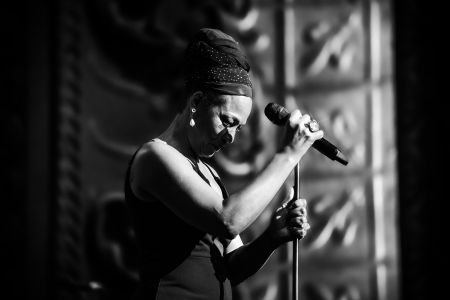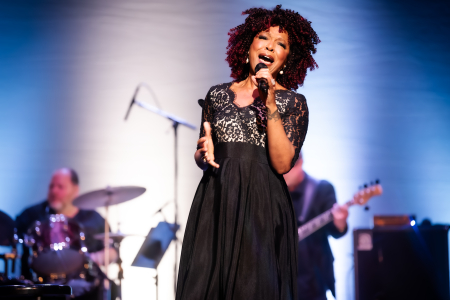State Theatre, July 10
7.5/10

What a blessing and curse it is to be the progeny of legend. The primary place in music history of the likes of Tina Sinatra, Jason Bonham, Mercer Ellington and Julian Lennon has almost inevitably become being their famous parent’s offspring. Lisa Simone has faced the same blessing and curse. Being Nina’s daughter helps her sell tickets, but also invites comparison with someone who’s probably never been matched for the sheer intensity of her singing (even if Nina primarily thought of herself as a pianist who wrote songs).
Lisa has found her own way of dealing with this. For a start, she did some growing up first, spending a decade in the US Air Force before becoming serious about singing, whereupon she concentrated on musical theatre, an area Nina never remotely approached.
 So when she did move in on her mother’s patch – blending jazz with soul and so much more (which Nina called “black classical”) – she had firm ground beneath her feet. She knew she couldn’t burn with her mother’s ferocity, but she had a large, attractive and true voice, and she could sing less confrontationally and be less aloof with her audiences.
So when she did move in on her mother’s patch – blending jazz with soul and so much more (which Nina called “black classical”) – she had firm ground beneath her feet. She knew she couldn’t burn with her mother’s ferocity, but she had a large, attractive and true voice, and she could sing less confrontationally and be less aloof with her audiences.
She could also perform her own songs as well as her mother’s, and thereby establish the concept of a “Simone legacy”.
The first half of this generous show was dedicated to her mother’s music in all its breadth of endeavour. Along with Nina’s own songs, there were those she made her own: as diverse as Please Don’t Let Me Be Misunderstood, I Put a Spell on You, Mr Bojangles and I Shall Be Released. The standout was Lisa’s reimagining of Nina’s angriest composition, Mississippi Goddam, her first and perhaps most caustic foray into civil rights protest songs. While Lisa’s softened delivery rode on a more sensual groove, but the lyrics (about race-motivated murder) didn’t lose their savage bite.
 When she returned after the interval, her hair was out, her clothes were looser, the grooves were sweatier, and she described herself as “more playful”. In fact, she was simply more at ease, with the emphasis now on her own finely crafted material, which allowed her band of expert Sydney musicians, led by pianist Bill Risby, to stretch out a little more – one of the oddities of the first half being how brief the pieces were.
When she returned after the interval, her hair was out, her clothes were looser, the grooves were sweatier, and she described herself as “more playful”. In fact, she was simply more at ease, with the emphasis now on her own finely crafted material, which allowed her band of expert Sydney musicians, led by pianist Bill Risby, to stretch out a little more – one of the oddities of the first half being how brief the pieces were.
Legacy, which she wrote when her mother died in 2003, was haunting, and the first song she wrote. The Child in Me, about her younger self’s need for a mother who was seldom there, was as telling as anything she did, capped by a fine solo from Risby.
She returned to material by or associated with her mother, including an especially energised Feeling Good, by which time you could feel she had won over an audience somewhat inclined to sit on its hands and wait to be fully convinced. We were.